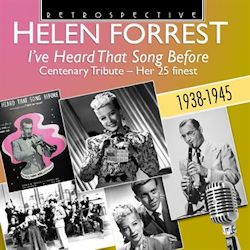
|
HELEN FORREST I’ve Heard That Song Before Centenary Tribute- Her 25 Finest 1938-1945
|
Thanks for Everything
Deep in a Dream
They Say
I Poured My Heart into a Song
Comes Love
Melancholy Mood
All the Things You Are
How High Is the Moon
I Can't Love You Any More
Taking a Chance on Love
I Don't Want to Walk Without You
He's My Guy
I Heard You Cried Last Night
Manhattan Serenade
I Had the Craziest Dream
Mister Five-by-Five
I've Heard That Song Before
Long Ago and Far Away
Time Waits for No One
It Had to Be You
Together
I'll Buy That Dream
Some Sunday Morning
I'm Always Chasing Rainbows
Oh, What It Seemed to Be!
Helen Forrest with Artie Shaw, Benny Goodman, Harry James, Victor Young, Earle Hagen, Toots Camarata and their orchestras, and with duets with Dick Haymes
Recorded 1938-45
Retrospective is building up a boutique selection of singers whose heyday was the 1930s and 40s. Helen Ward is a case in point and Dick Haymes, who duets in some tracks with the subject of this latest disc, Helen Forrest, is also represented in the series. A versatile Big Band songstress, Forrest moved easily, though sometimes to pecuniary disadvantage, between the leading bands of the time. The earliest tracks here are with Artie Shaw in 1938 but when he quixotically disbanded Forrest was forced to contact his rival and fellow clarinettist, Benny Goodman, who snapped her up at a reduced fee.
Her light, youthful and easy delivery can be savoured in these tracks. Her diction is also first class throughout. It’s an added pleasure to hear Shaw’s biting clarinet solos and Georgie Auld’s occasional tenor solos for Shaw. Irving Berlin’s typically witty lyrics grace I Poured My Heart Into A Song whilst Forrest’s elegant but honest intimacy irradiates All The Things You Are. Goodman had a raft of outstanding soloist at this time – the roll call ran from Ziggy Elman and Cootie Williams to Charlie Christian via Cutty Cutshall, Lou McGarity, Jerry Jerome and Auld, a refugee, like Forrest, from the disbanded Shaw band.
Forrest left Goodman and joined Harry James in 1941. Her singing is a fitting riposte to the trumpet’s bravura solo on I Don't Want to Walk Without You and she manages to be confiding without in any way courting the cloying inI Heard You Cried Last Night. The copy used to transfer Manhattan Serenade sounds rather scruffy but there’s a lush string section on board which might turn things. In her duets with Haymes, which were backed by Toots Camarata, Victor Young and Earle Hagen and their orchestras, Forrest’s vibrato is kept under perfect control and her charmingly deft portamentos are splendidly gauged. Haymes remains suave and languorous when necessary.
Peter Dempsey’s notes tell you all you need to know and the transfers are pretty good.
Jonathan Woolf